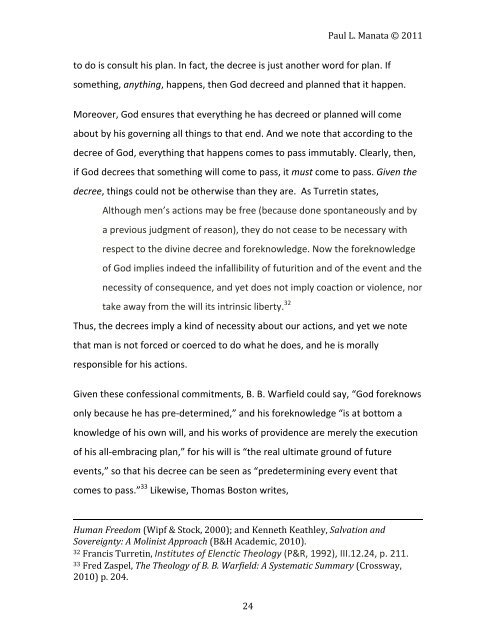Free Will, Moral Responsibility, and Reformed Theology - Analytic ...
Free Will, Moral Responsibility, and Reformed Theology - Analytic ...
Free Will, Moral Responsibility, and Reformed Theology - Analytic ...
You also want an ePaper? Increase the reach of your titles
YUMPU automatically turns print PDFs into web optimized ePapers that Google loves.
24<br />
Paul L. Manata © 2011<br />
to do is consult his plan. In fact, the decree is just another word for plan. If<br />
something, anything, happens, then God decreed <strong>and</strong> planned that it happen.<br />
Moreover, God ensures that everything he has decreed or planned will come<br />
about by his governing all things to that end. And we note that according to the<br />
decree of God, everything that happens comes to pass immutably. Clearly, then,<br />
if God decrees that something will come to pass, it must come to pass. Given the<br />
decree, things could not be otherwise than they are. As Turretin states,<br />
Although men’s actions may be free (because done spontaneously <strong>and</strong> by<br />
a previous judgment of reason), they do not cease to be necessary with<br />
respect to the divine decree <strong>and</strong> foreknowledge. Now the foreknowledge<br />
of God implies indeed the infallibility of futurition <strong>and</strong> of the event <strong>and</strong> the<br />
necessity of consequence, <strong>and</strong> yet does not imply coaction or violence, nor<br />
take away from the will its intrinsic liberty. 32<br />
Thus, the decrees imply a kind of necessity about our actions, <strong>and</strong> yet we note<br />
that man is not forced or coerced to do what he does, <strong>and</strong> he is morally<br />
responsible for his actions.<br />
Given these confessional commitments, B. B. Warfield could say, “God foreknows<br />
only because he has pre-‐determined,” <strong>and</strong> his foreknowledge “is at bottom a<br />
knowledge of his own will, <strong>and</strong> his works of providence are merely the execution<br />
of his all-‐embracing plan,” for his will is “the real ultimate ground of future<br />
events,” so that his decree can be seen as “predetermining every event that<br />
comes to pass.” 33 Likewise, Thomas Boston writes,<br />
Human <strong>Free</strong>dom (Wipf & Stock, 2000); <strong>and</strong> Kenneth Keathley, Salvation <strong>and</strong><br />
Sovereignty: A Molinist Approach (B&H Academic, 2010).<br />
32 Francis Turretin, Institutes of Elenctic <strong>Theology</strong> (P&R, 1992), III.12.24, p. 211.<br />
33 Fred Zaspel, The <strong>Theology</strong> of B. B. Warfield: A Systematic Summary (Crossway,<br />
2010) p. 204.


